Meet LancasterHistory’s Summer Intern Class of 2023
This summer, LancasterHistory welcomed five undergraduate students into our NEH Summer Internship Program. We also welcomed two students who worked exclusively on projects relating to the Thaddeus Stevens & Lydia Hamilton Smith Center for History & Democracy. Starting in early June, the interns worked on various individual projects, participated in workshops, and travelled to other museums throughout the region. In this post, you’ll get to meet each intern and learn about their projects!
Carsten Brodbeck, Historic Site Management
What Carsten Worked On:
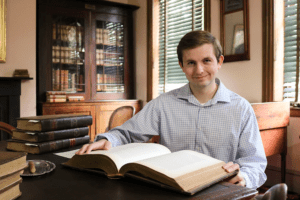
As the Historic Site Management intern, Carsten worked under LancasterHistory’s Director of President James Buchanan’s Wheatland, Patrick Clarke. Carsten worked on updating various artifact accession records in PastPerfect, a museum collection database and management software. As part of this accessioning process, Carsten had the opportunity to view and handle numerous historic objects at Wheatland. In addition, Carsten also worked on creating a digital exhibit about James Buchanan’s policy towards Native Americans. In particular, Carsten researched the diplomacy between the Buchanan Administration and the Ponca, Pawnee, and Potawatomi Nations. He then utilized Google’s Art & Culture platform to create a digital exhibit for LancasterHistory about this topic. Once approved by Google, the exhibit will be available to view through Google Cultural Institute and on LancasterHistory’s website.
About Carsten:
Carsten is a rising junior at Dickinson College in Carlisle, Pennsylvania. He has interests in a wide array of historical topics, including medieval history, American colonial history, and Native American history. In his spare time, Carsten enjoys reading, writing, following Philadelphia sports, and spending time with his friends and family. A fun fact about Carsten is that he will be studying abroad in England in 2024! After graduating in 2025, Carsten hopes to pursue a graduate degree in history with the ultimate goal of seeking a career in history education.
Favorite Internship Moment?:
Carsten’s favorite internship moments were touring the museums in the surrounding area. Interns at LancasterHistory were given the opportunity to visit a wide array of museums every Thursday. As a life-long lover of learning, Carsten found the field trips riveting and thought they offered good insight into the museum field.
Grace Celley, Library
What Grace Worked On:
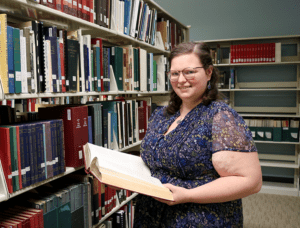
During her internship in the Library, Grace worked under the guidance of Aimee Caya, the Director of Library & Research Services. Grace has been spending much of her time going through family files and updating the Library’s database to help patrons find the names of ancestors through LancasterHistory’s online databases. In the process, Grace has also been examining primary and secondary sources and learning about the history of central Pennsylvania.
About Grace:
Grace is a rising senior at Millersville University studying history with a minor in Women, Gender, and Sexuality Studies. She’s specifically interested in the intersection of gender and class in the history of the Atlantic. Grace is also involved with Phi Alpha Theta, a honors society for history, where she will serve as their secretary for this upcoming academic year. She’s also a fellow with the Center for Civic Responsibility and Engagement at Millersville University. After she graduates, Grace hopes to become a certified genealogist before pursuing a Master’s degree in history and Information & Library Science.
Favorite Internship Moment?:
Grace’s favorite part of the internship was seeing the ways the Atlantic world shaped and has been shaped by the people of central Pennsylvania. During her internship, she read very interesting stories about the people of Lancaster, ranging from the spread of diphtheria to sharp shooters in the American Revolution and everything in between.
Kayla Stevens, Museum Education & Exhibition Planning
What Kayla Worked On:
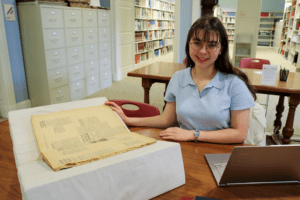
During her internship, Kayla worked under the supervision of Dr. Mabel Rosenheck, the Director of Education and Exhibition Planning. Kayla’s main project was to create a digital exhibit to supplement Thieves & Vagabonds, LancasterHistory’s upcoming major exhibition. Eventually available to view both in the physical exhibit and online, the digital exhibition centers around the individuals whose stories may not be fully represented by the artifacts in LancasterHistory’s collections. In particular, it will focus on Prohibition-era Lancaster County, describe the intertwined lives of several individuals, and examine the implications of Prohibition law and enforcement in Lancaster and beyond.
About Kayla:
Kayla graduated from the College of Wooster this May, receiving a Bachelor of Arts in Anthropology. She also minored in Environmental Studies and completed an interdisciplinary career-based Museum and Archival Studies Pathway. Her Senior Independent Study thesis, “‘Does this spark joy?’: Aesthetics, Gender, and Ideals in Marie Kondo’s The Life-Changing Magic of Tidying Up,” explores how Japanese and non-Japanese college students interpret the book and its representation of Japanese culture. A fun fact about Kayla is that she plays the clarinet and performed in Wooster’s marching band, symphonic band, and community symphony orchestra.
Favorite Internship Moment?:
Kayla’s favorite memory so far was visiting the Thaddeus Stevens and Lydia Hamilton Smith Center for History & Democracy. It was exciting to get a behind-the-scenes tour of the location and learn about the archaeological dig. She looks forward to seeing LancasterHistory’s plans for the Thaddeus Stevens and Lydia Hamilton Smith Center for History and Democracy come to fruition!
Emma Streb, Archives
What Emma Worked On:
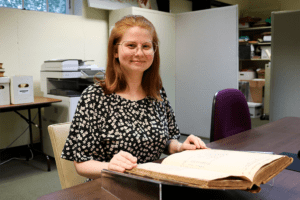
As the Archival Services intern, Emma worked under LancasterHistory’s Director of Archives & Manuscript Collections, Heather Tennies. This summer Emma worked with 15 volumes related to businesses of the Brown and Smedley families. Jeremiah Brown (1785-1858) and Joel Smedley (1799-1872) owned and operated local gristmills and sawmills where they milled grain, cut boards, and sold products to those living in Fulton and Little Britain Township. She worked to catalog the recent accession—researching the families and their role in Lancaster, creating DACS-compliant finding aids, and recording the information gathered in PastPerfect.
About Emma:
Emma just graduated from Kutztown University with a degree in History and Political Science. She is pursuing her Master’s in Library Science with a concentration in Archive Management at Simmons University starting this fall. Professionally, Emma is interested in special collections, preservation, and cataloging. Academically, she is interested in studying urban planning with a focus historical preservation, education, and gentrification. Emma hopes to stay in York & Lancaster County as she completes her Master’s and pursues independent research.
Favorite Internship Moment?:
Emma’s favorite experience in LancasterHistory’s Archives was when she found more business records from Joel Smedley that had been processed in 2003 and last updated in 2009. There were three journals that seemed like they were intrinsically linked to those found in the recent accession. She was able to determine two journals were dated later than those found in the recent accession and the last, dated earlier, signaled Joel’s leading the family farm after his mother, Rebecca Lewis (1759-1847), had passed.
Maura Tyson, Curatorial
What Maura Worked On:
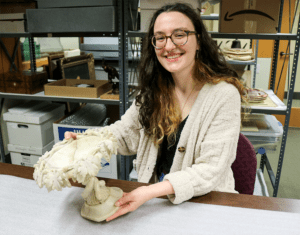
During her internship, Maura worked under the supervision of Dr. James McMahon, LancasterHistory’s Curator & Director of Collections. Maura worked on a variety of projects, including updating accession records for James Buchanan’s pink Parisian china in PastPerfect and entering accession data for a large collection of silver spoons. Over the course of her internship, Maura was able to observe and help Dr. McMahon as he worked on other projects such as coordinating the preservation of furniture for Wheatland and the Thaddeus Stevens & Lydia Hamilton Smith Center for History & Democracy and winding the eight-day clock at LancasterHistory every week.
About Maura:
Maura is currently a student at Goucher College in Baltimore, Maryland where she is studying Visual and Material Culture. During her college career, she’s been learning much about art history and museum studies, especially in the medieval, Renaissance, and Victorian eras. She’s also been able to visit different historical and cultural sites around Baltimore. In her free time, she enjoys reading, playing video games, and watching videos of people playing her favorite video games.
Favorite Internship Moment?:
Maura’s favorite internship moments were all the off-site field trips and adventures she was able to go on with the other interns and her supervisor. She particular enjoyed visiting the State Museum in Harrisburg and the Demuth Museum in Lancaster.
Sam Bisno, Stevens & Smith Center Intern
What Sam Worked On:
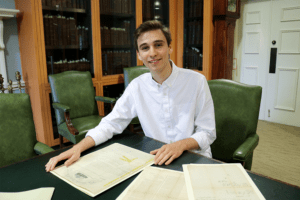
Sam worked under Research & Development Assistant Naomi Subotnick to develop the galleries of the upcoming Thaddeus Stevens & Lydia Hamilton Smith Center for History and Democracy. He conducted research using the LancasterHistory collections to identify primary documents for display at the museum, organized around three broad themes: antebellum Lancaster, slavery and freedom in the North, and the Civil War and Reconstruction. The materials Sam located included stockholder registries linking Stevens to Lancaster’s emerging nineteenth-century industries, estate inventories and bills of sale listing enslaved Black Lancastrians among the “property” of Lancaster’s leading citizens, and a ticket to Andrew Johnson’s impeachment hearing. Sam was also fortunate to participate in high-level planning meetings, learning the intricacies of museum design and offering suggestions around the Center’s treatment of slavery and the Civil War era.
About Sam:
Sam is a senior at Princeton University concentrating in history with certificates in African American Studies, Latin American Studies, and Humanistic Studies. His research interests include the history of slavery and capitalism in the nineteenth-century United States. He is currently working on his thesis, which charts the manufacture, distribution, and implementation of cotton gins in the antebellum U.S. as well as the impact of industry and technology on the lives of enslaved people. He hopes to pursue a doctorate in history. A fun fact about Sam is that he can juggle (but only with three perfectly round, palm-sized objects).
Favorite Internship Moment?:
Sam’s favorite moment of the internship was his discovery of Lancastrian Jacob Weitzel’s 1834 patent for a whiskey still, signed by Andrew Jackson. The patent, with its detailed description and large decorative seal, was fascinating in itself—but things really got fun when Sam realized that fellow Lancastrian J. F. Reigart had produced a watercolor depiction of the still, housed in Collections. Soon Sam, Naomi, and Curator & Director of Collections Dr. James McMahon were crowded around a table, marveling at the small but elaborate illustration. Sam appreciated how everyone stopped what they were doing to locate the watercolor simply because it piqued their historical curiosity. The experience demonstrated to him the interdisciplinary collaboration underpinning public history and the close relationship between primary source documents, visual sources, and material culture and technology.
Julivette Torres, Stevens & Smith Center Graduate Intern
What Julivette Worked On:
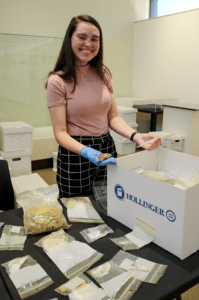
During her internship, Julivette worked under the supervision of Research & Development Assistant Naomi Subotnick on the Thaddeus Stevens & Lydia Hamilton Smith Center for History & Democracy. Specifically, she worked in collections management, handling objects received from an archaeological survey performed in the early 2000s on the Stevens & Smith site. Phase 1 of her project included cataloging the historic artifacts, which included measuring, photographing, and researching objects that were confirmed for display at the future museum. Phase 2 includes processing over sixty boxes of archaeological materials and conducting a first round of object selection and cataloging. Although many of the objects will speak primarily to the dig conducted at the site, Julivette processed many items that will help tangibly build the story of Stevens, Smith, and their Lancaster City block in general.
About Julivette:
This fall, Julivette will be in her last semester of graduate school at Shippensburg University in the Applied History program with a concentration in Museum Studies. She works in the Ezra Lehman Memorial Library as a circulation supervisor and often volunteers in the university archives to combine her interests in libraries and history. She received her Bachelor of Arts in History with a minor in Spanish at Kutztown University, during which she previously participated in LancasterHistory’s NEH Internship Program (Class of 2020). She’s interested in working in exhibition development and museum administration. A fun fact about Julivette is that she can solve a Rubik’s cube in under a minute!
Favorite Internship Moment?:
Julivette’s favorite internship moment was going through the boxes of archaeological material and finding fully intact bottles, specifically medicine bottles. She also enjoyed going on adventures to find who manufactured the bottles and what their purpose may have been. No two boxes were the same, so it was interesting to see what was recovered and its state of composition. She also enjoyed the mini-field trips with Naomi and LancasterHistory staff.
Our interns’ last day is today, and we will surely miss their presence on campus. However, we wish them all the best in all their future endeavors (and to visit us again soon)!
If the LancasterHistory NEH Summer Internship program sounds like something you’d be interested in (or an undergraduate college student you know!), you can learn more about the program on our website here.
Support for the LancasterHistory NEH Summer Internship program provided by a
National Endowment for the Humanities We the People Challenge Grant.

Any views, findings, conclusions, or recommendations expressed on this website, do not necessarily represent those of
the National Endowment for the Humanities.
